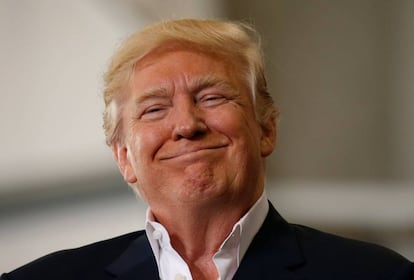Firmness with Trump
Chaos, scandals and threats have defined the first month of the billionaire businessman’s presidency

Donald Trump’s first month as president of the United States has confirmed that he is prepared to fulfill the pledges he made during his election campaign, regardless of how controversial, irrational, illegal, or dangerous they might be. But these first four weeks in the Oval Office have also shown that firmness works and that although he might redouble his efforts when faced with an obstacle, the president doesn’t always get his own way.
This first month has been a disaster. There is confusion over roles and responsibilities among a team that reflects a worrying tendency toward nepotism, illustrated by the presence in the president’s close circle of chief strategist Steve Bannon, who in a break with tradition has also been appointed to the National Security Council; and his son-in-law Jared Kushner, who is a senior advisor. His daughter Ivanka, meanwhile, is taking on the unprecedented role of second first lady.
Trump has shown he is a man who will take advantage of those he considers weaker than him
Trump has shown little care in choosing other members of his Cabinet: Michael Flynn lasted less than three weeks in his role as national security advisor after it emerged he had had contacts with Moscow. The president’s response to these revelations has been to demonstrate his authoritarian tendencies by ordering a purge of the security services and to accuse the media of being “out of control.”
Disruption has become the hallmark of the Trump administration. His controversial presidential decrees – among which the temporary travel ban on refugees and citizens from seven majority Muslim nations stands out – reflect both a lack of forethought, as illustrated by the sacking of the State Attorney, along with a view of power as something personal that ignores Congress, the courts, the business world and civil society. This approach has been applied to international relations, with Trump changing US policy toward Israel without thinking of the consequences or putting Mexico in the spotlight.
But as Trump has already seen, his aggressive approach in trying to intimidate the media and his opponents might please those who voted for him, but won’t work with those who aren’t afraid of him. With China and North Korea, and partly with Iran, the new president has had to back down to prevent public opinion from realizing that he is not all powerful.
There is confusion over roles and responsibilities among a team that reflects a worrying tendency toward nepotism
When it comes down to it, there is little detail in his threats. Exiting the free trade deal with the Pacific Rim nations, leaving China the main player in the region, has been the only transparent and public decision. But Trump also promised to lower taxes, which the markets are eagerly awaiting. At the same time, we have heard nothing specific about his much-vaunted infrastructure plan, one of the main drivers in boosting domestic demand. In the absence of any specific measures it is not surprising that Janet Yellen, the Chair of the Board of Governors of the Federal Reserve, has expressed concerns. Without economic information based on real decisions, it is not possible to decide on monetary policy.
The most serious economic threat comes from his already-announced and probably well-advanced plans to de-regulate the financial sector. Yellen has been warned that she should not sign any new regulatory agreements such as Basel, as well as about the president’s opposition to membership of organizations such as Financial Stability Oversight Council or the International Association of Insurance Supervisors. If Trump carries out his threat to return to the days when there was no separation between investment and commercial banking, he will only increase international financial disorder in the short term and banking imbalances between different currency zones in the longer term.
Given that protectionism and deregulation will lead to global chaos, even if in the first instance they favor protected markets, Europe needs to stand firm against Trump, a man who has shown he will take advantage of those he considers weaker than him, but who takes a more conciliatory line when confronted with a tougher attitude. It is worth learning Trump’s language and understanding that the only way to deal with him is with firmness.
English version by Nick Lyne.
Tu suscripción se está usando en otro dispositivo
¿Quieres añadir otro usuario a tu suscripción?
Si continúas leyendo en este dispositivo, no se podrá leer en el otro.
FlechaTu suscripción se está usando en otro dispositivo y solo puedes acceder a EL PAÍS desde un dispositivo a la vez.
Si quieres compartir tu cuenta, cambia tu suscripción a la modalidad Premium, así podrás añadir otro usuario. Cada uno accederá con su propia cuenta de email, lo que os permitirá personalizar vuestra experiencia en EL PAÍS.
¿Tienes una suscripción de empresa? Accede aquí para contratar más cuentas.
En el caso de no saber quién está usando tu cuenta, te recomendamos cambiar tu contraseña aquí.
Si decides continuar compartiendo tu cuenta, este mensaje se mostrará en tu dispositivo y en el de la otra persona que está usando tu cuenta de forma indefinida, afectando a tu experiencia de lectura. Puedes consultar aquí los términos y condiciones de la suscripción digital.








































